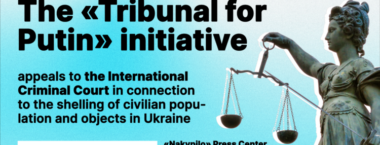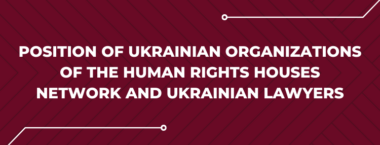On August 10, the UN Committee against Torture (CAT) has published its findings, officially termed concluding observations, on the RF sixth periodic report being examined during its latest session.
This country’s official report was accompanied by an alternative one, co-authored by the Ukrainian Helsinki Human Rights Union, Regional Center for Human Rights, Media Initiative for Human Rights and individual experts, as regard the RF compliance with the UN Convention against Torture and Other Cruel, Inhuman or Degrading Treatment or Punishment in the territory of occupied Crimea.
Serving as an additional source of reliable information (which allows cross-check and verification of data submitted by the national government), this “shadow” report brought to light the systematic practice of torture, inhuman and degrading treatment that has been continuously applied by Kremlin since 2014 as an integral component of its overall repressive policy towards Crimean residents.
Almost all our findings and recommendations are considered by the CAT that calls Russia to put an end to the practice of torture in Crimea and the city of Sevastopol, ensure the prosecution and punishment of the perpetrators, provide victims with redress and to ensure unimpeded access to peninsular by the international human rights monitoring mechanisms.
UHHRU would like propose to your attention an extract from the Concluding observations that relates to Crimea and the city of Sevastopol, while the full text is available here.
Concluding observations on the sixth periodic report of the Russian Federation
- The Committee against Torture considered the sixth periodic report of the Russian Federation (CAT/C/RUS/6) at its 1658th and 1661st meetings, held on 25 and 26 July 2018 (see CAT/C/SR.1658 and CAT/C/SR.1661), and adopted the present concluding observations at its 1676th and 1677th meetings, held on 8 August 2018.
- Principal subjects of concern and recommendations
Crimea and the city of Sevastopol
- Without prejudice to the legal status of Crimea under international law, and emphasizing the fundamental importance of the principle of territorial integrity of all States Members of the United Nations, the Committee notes that Crimea is under the effective control of the Russian Federation and that the Russian Federation has the obligation to implement the Convention in Crimea.
The Committee expresses its concern about:
(a) Persistent reports of serious human rights violations, including abductions, arbitrary detentions, enforced disappearances, torture, ill-treatment and extrajudicial killings, particularly of the Crimean Tatars, pro-Ukraine activists and affiliates of the Mejlis, by members of the Federal Security Service and the Crimean self-defence;
(b) Information that since 2014, torture has been routinely used by the authorities to obtain false confession for politically motivated prosecutions, including in the case of Oleg Sentsov, a Ukraine filmmaker, who was allegedly tortured in Crimea;
(c) Reports that out of 106 allegations of torture by the public officials from February 2014 to June 2018, not a single case was effectively investigated;
(d) Deplorable conditions of detention, in particular inadequate access to medical care which resulted in numerous deaths in custody;
(e) Limited access to detention facilities by an independent monitoring mechanism, civil society and lawyers of detainees; (f) Denial of access to Crimea by the international human rights monitoring mechanisms, particularly the United Nations Human Rights Monitoring Mission in Ukraine (HRMMU) (arts. 2, 4, 11, 12 and 16).
- The State party should take immediate measures to put an end to the practice of torture in Crimea, including for the purpose of pressuring, punishing and/or extracting confessions from political opponents and activists, such as Oleg Sentsov. The State party should promptly, impartially and effectively investigate all complaints of torture and other acts prohibited by the Convention, in particular such acts by members of the Federal Security Service and the Crimean self-defence. It should ensure the prosecution and punishment of the perpetrators and provide victims with redress. The Committee also invites the State party to ensure unimpeded access to Crimea by the international human rights monitoring mechanisms, in particular the United Nations Human Rights Monitoring Mission in Ukraine (HRMMU).
Other issues
- The State party is invited to submit its next report, which will be the seventh periodic report, by 10 August 2022. To that purpose, the Committee will, in due course, submit to the State party a list of issues prior to reporting, considering that the State party has accepted to report to the Committee under the optional reporting procedure.



